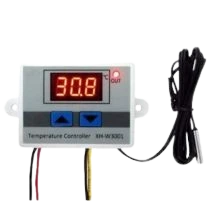BIS Certification for Temperature Sensing Controls IS/IEC 60730-2-9:2011

In an age where automation and
precision play a crucial role in household appliances and industrial systems, temperature sensing controls have
become fundamental components. Whether in HVAC systems, water heaters, washing
machines, or refrigeration units, these controls regulate temperature with high
accuracy and safety.
Given their importance and wide application in everyday appliances, it is vital that these controls meet stringent safety and performance standards. In India, such controls are regulated under the IS/IEC 60730-2-9:2011 standard, and BIS certification is required to ensure their compliance.
Understanding IS/IEC
60730-2-9:2011
IS/IEC 60730-2-9:2011 is a specific
section of the broader IEC 60730 standard, which deals with automatic electrical controls for household
and similar use. Part 2-9 focuses specifically on temperature sensing controls, outlining essential performance and
safety criteria that these devices must fulfill.
The scope of this standard includes controls that respond to temperature changes, typically used to monitor and regulate heating, cooling, or combined systems. Devices like thermostats, thermistors, and integrated temperature sensors fall under this category. These may be stand-alone or embedded into larger systems and are often used in appliances for both residential and similar non-industrial applications.
Importance of BIS
Certification for Temperature Sensing Controls
Since these controls directly impact
the functioning and safety of essential equipment, any failure can result in
overheating, short circuits, fire hazards, or system malfunctions. BIS
certification acts as a mandatory
compliance mechanism that ensures only products meeting Indian safety
benchmarks are allowed in the market.
For manufacturers and importers,
obtaining BIS certification:
Key Testing Parameters
under IS/IEC 60730-2-9:2011
To qualify for BIS certification,
temperature sensing controls must pass a series of tests defined in the
standard. These tests are designed to evaluate the device's structural
integrity, electrical safety, environmental resilience, and long-term
reliability.
Some of the essential tests include:
● Protection Against Electric
Shock
● Provision of Protective
Earthing
● Terminals and Terminations
● Construction Requirements
● Moisture and Dust Resistance
● Electric Strength and
Insulation Resistance
● Heating Test
● Manufacturing Deviation and
Drift
These tests are conducted either at BIS-approved laboratories or within compliant factory environments and are a core part of the certification process.
BIS Certification Process at a Glance
Though BIS certification is a
technical process, the core steps remain structured and straightforward:
- Application Submission: The manufacturer applies to BIS with product details and relevant documentation.
- Factory Audit: BIS officials inspect the manufacturing unit to assess quality control systems and production capabilities.
- Sample Testing: Product samples are drawn and sent for testing to evaluate compliance with IS/IEC 60730-2-9:2011.
- Grant of License: Upon satisfactory audit and test results, BIS issues the ISI mark license for the product.
- Ongoing Surveillance: Periodic inspections and testing ensure continued compliance with BIS standards.
To Know The Process in Detail, Please Visit:
Under BIS Registration Products ISI and CRS
Documents Required for BIS Certification
To apply for BIS certification, manufacturers need to submit the following documents:
● Application form
● Manufacturing process details
● Quality control plan
● Test reports from BIS-approved laboratories
● Factory layout and equipment details
● Proof of business registration
● Product specifications and technical details
● Declaration of conformity to Indian standards
Additionally, manufacturers may be required to provide proof of compliance with environmental and safety regulations, depending on the specific type of product being certified.
BIS ISI Mark Certification Costing And Timeline
How EVTL India Supports the Certification Process
Navigating the BIS certification
process can be complex, especially when it involves highly technical standards
like IS/IEC 60730-2-9:2011. EVTL India,
a leading regulatory consultancy, offers complete support for manufacturers
seeking compliance.
EVTL India's team assists with:
Whether you're a domestic producer or an international brand entering the Indian market, EVTL India ensures your products meet the required standards efficiently and effectively.
Conclusion
In the world of automation and home
appliances, temperature sensing controls
serve as critical safety and operational components. BIS certification under IS/IEC 60730-2-9:2011 ensures that
these devices are built to last, function reliably, and comply with all safety
norms.
For manufacturers, this certification
is not just a regulatory checkbox—it’s a mark of commitment to quality, safety,
and consumer trust. As the demand for smart and efficient appliances grows,
certified temperature controls will continue to play a vital role in India’s
evolving electronics ecosystem.
Free Call Back
Latest News & Update
📅 BIS Critical Component List (CCL) Updates for Solar PV Modules
🕒 BIS Fee Concessions for MSMEs and Startups | EVTL India
📅 Guidelines for Implementation of Essential Requirements for Security of CCTV
🕒 Omnibus Technical Regulation (OTR) Amendment Order, 2025
🕒 Extension of Timeline for Filing Annual Returns by Battery Producers
📅 Extension of Timeline for Filing Quarterly and Annual Returns for E-Waste
🕒 Extension of Concurrent Running Period for IS 302-1: 2008 and IS 302 (Part 1): 2024
🕒 BIS Guidelines for Grant of Licence (GoL) | EVTL India
📅 CPCB Guidance on filing of Application, Fees and more
🕒 CPCB Notification on Labelling of Plastic Packaging
📅 Mandatory Compliance for Input Materials of Steel and Steel Products for Imports
🕒 BIS Guidelines for Scheme-X Certification for OTR-Regulated Products
📅 BIS Upgrades Product Certification License Numbers to 10-Digit Series
Why Choose EVTL INDIA
Expertise in Indian Regulatory Standards
End-to-End Support
Trusted by Top Indian & Global Brands
Fast Processing & Transparent Pricing
Strong Liaison with Indian Authorities
Company Profile


















